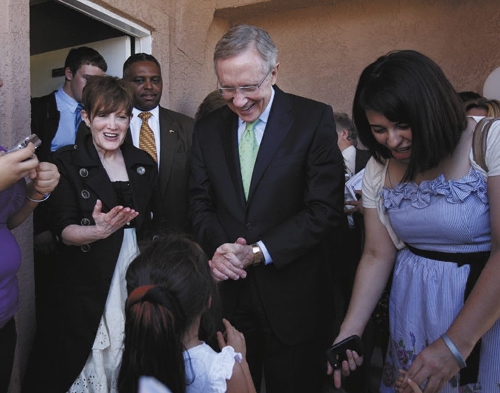Reid: How can Hispanics be Republican?
U.S. Sen. Harry Reid on Tuesday slammed Republicans for blocking comprehensive immigration reform and told Hispanics they shouldn't be treated differently because "their skin's a tone darker" than that of America's early European immigrants.
"I don't know how anyone of Hispanic heritage could be a Republican, OK," Reid said, speaking to Latino supporters whose votes he needs to win re-election in November. "Do I need to say more?"
Reid's open frustration stems from what the Senate majority leader said is GOP refusal to support any Democratic plan that includes a path toward U.S. citizenship for 11 million illegal immigrants in the United States.
And his sharp attack comes as he faces a tough race against Republican Sharron Angle, who supports Arizona's law cracking down on illegal immigrants. She argues that the federal government has failed to enforce the laws and stop the stream of people sneaking into the country.
In April, Reid promised a rally of Hispanic activists in Las Vegas that he would deliver comprehensive immigration reform this year and that there would be "no excuses" for failure.
"We're going to do immigration reform just like we did health care reform," Reid said April 10.
But when he got back to Washington, he immediately lost key support from Sen. Lindsey Graham, R-S.C., who wanted Reid to consider energy legislation first before working on immigration.
"Republicans," Reid replied Tuesday when asked what kept him from keeping his promise.
Asked whether the push for immigration reform would hurt Democrats when polls in Nevada and nationwide show strong support for Arizona's law, Reid suggested his opponents had "stepped out of the real world for a couple of years" and didn't see that comprehensive reform is needed.
That's when Reid said he didn't understand how anyone could be both Hispanic and a Republican, a comment sure to upset prominent GOP leaders and politicians with that heritage.
Reid's oldest son, Clark County Commission Chairman Rory Reid, is running for governor against former federal Judge Brian Sandoval, a Hispanic Republican who supports Arizona's law, which allows police to question people about their legal status if stopped for some other reason.
"We're a nation of immigrants," Harry Reid said, using the example of his wife, Landra, to point to America's history of accepting people from all nations as the country grew and prospered.
"My wife's father was an immigrant from Russia," Reid said of his father-in-law, who was of the Jewish faith at a time of deadly religious persecution across Europe. "He and his family were driven out of Russia. They came for the peace and quiet and safety of the United States.
"Immigration is nothing new," Reid added, speaking to more than 50 mostly activist Hispanics who applauded his anti-GOP remarks. "We are a nation of immigrants. So because the wave of immigrants we have now -- their skin's a tone darker than ours -- doesn't make it any different."
Tibi Ellis, chairwoman of the Nevada Republican Hispanic Caucus, dismissed Reid's shot at her party as "political rhetoric" in a highly competitive election year. She said Reid "has been a friend of the Hispanic community, but so have so many people of the Republican Party."
In an interview, Ellis noted that former Republican President Ronald Reagan successfully pushed for immigration reform. And former GOP President George W. Bush, who was popular among Hispanics, pressed for reform in 2006, though Reid blocked it at the time. Reid later joined Republican Sen. John McCain of Arizona in a bipartisan effort at comprehensive immigration reform, which failed in 2007.
"The reality is, both Republicans and Democrats have put forward immigration reform in this nation," Ellis said. "President Barack Obama promised comprehensive immigration reform in the first 100 days, and he's been in office for two years and he hasn't done anything."
In Nevada, estimates of illegal immigrants range from 150,000 to 250,000 out of a total population of less than 3 million people. Hispanics make up about 25 percent of the total state population and accounted for a record high 15 percent of the electorate in 2008 after a Democratic Party registration push. In Clark County, registered Democrats with Hispanic surnames outnumber Republicans with Hispanic surnames about 3-to-1, or 55,224 to 17,525, according to August figures.
Reid said that McCain, who is in a tough re-election race himself this year, is now one of the senators blocking Democratic attempts at comprehensive immigration reform.
"I understand the frustration of the people of Arizona and the people of Nevada," Reid said, adding that the two senators from Arizona are among those "yelling the loudest" now. "It is a federal problem. I acknowledge that. So why don't we fix it? They won't let us."
Instead of comprehensive reform -- which would deal with everything from tightening border security to allowing illegal immigrants to declare themselves and seek citizenship after paying fines and penalties -- Reid said he now is moving to help illegal immigrants in other ways.
For example, Reid is pushing for separate passage of the Dream Act. It would allow children of illegal immigrants to complete their college education during a six-year period under temporary permanent residency status, which would put them on a path to U.S. citizenship.
"We think we may have a few senators who are Republicans who will help us with the Dream Act," Reid said, referencing six Republicans he planned to call for support without naming them.
Angle has said she doesn't support any Democratic reform proposals on immigration because she believes most are disguised attempts to grant amnesty to people who have broken U.S. laws.
Reid also is promoting a bill to cut taxes for teachers who help immigrants learn English.
And on Tuesday, he joined Hispanic groups to launch a radio program to air on KRLV 1340 AM Voz de la Comunidad that will teach English to Nevada's Spanish-speaking population.
"Learning English is an essential step to being fully integrated into American society," Reid said during his news conference at Hermandad Mexicana, a Hispanic advocacy group.
The radio program is privately funded at an initial cost of $50,000 by a San Antonio-based group called Mexicans and Americans Thinking Together, or MATT.
Michael Flores, a local immigrant rights activist with ProgressNow Nevada, said he supports the Dream Act but worries its success could spell the end for comprehensive immigration reform, a concern that has caused a rift in the community of those seeking major change.
"What's scary is, you do the Dream Act and people are going to say, 'That's good enough. We don't have to do anything else,' " he said in an interview.
Review-Journal reporter Lynnette Curtis contributed to this story. Contact Laura Myers at lmyers@reviewjournal.com or 702-387-2919.
LANDRA REID DOING 'OK'
Looking healthy and strong, Landra Reid is back.
She's back in Nevada, and she's back on the campaign trail with her husband, U.S. Sen. Harry Reid, for the first time since a March 11 car accident outside Washington, D.C.
The 70-year-old mother of five broke her neck and required surgery after the crash, and she couldn't get out of bed for weeks.
The last time she was in Nevada was when the senator filed for re-election on March 8.
"I'm doing OK," Landra Reid said during a short chat on the sidelines of a Las Vegas event with her husband to promote an English-language learning program for Latino immigrants.
"I'm just glad to be back in Nevada and to be able to walk around," she added. "It's been a long time."
The couple, who have been married for more than 50 years, have campaigned together since Harry Reid won a Nevada Assembly seat in 1968.
When he kicked off a rural tour of Nevada in April from his hometown of Searchlight, he spoke of how much he missed having his wife at his side.
"We were really looking forward to this two and a half weeks home," he told the Searchlight gathering, but he said he was confident she'd fully recover. "She got hit really hard, but she's tough."
On Tuesday, Landra Reid showed a bit of that toughness, saying she didn't feel much different other than the "metal plate in my neck."
"You can bump me -- I'm OK," she said with a laugh.
LAURA MYERS / LAS VEGAS REVIEW-JOURNAL





























